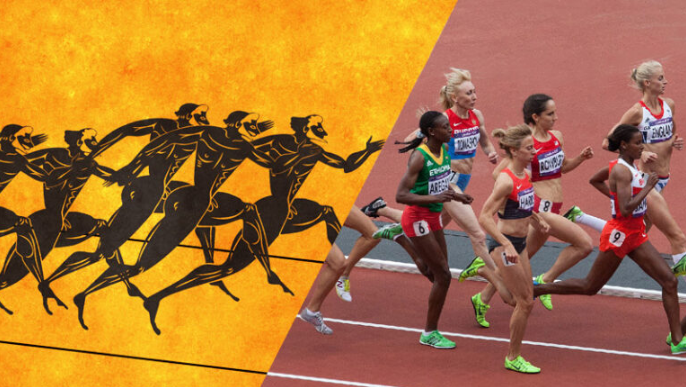In the Never-ending Pursuit of Better, Faster & Stronger
Written by Lena Grundhoefer
In the 21st century where the relentless quest for the next tech unicorn or the ultimate entertainment spectacle knows no bounds, billionaire Peter Thiel’s latest venture might just be the most unhinged yet.
Forget the latest in AI wonders or celebrities decked out in absurd outfits (The Masked Singer). What we’re talking about here is as contentious as it is utterly fascinating—
A steroid-embracing Olympics

ZENITH – the highest point reached by a heavenly body as it travels around another
This bold leap, straying far from the roots of the time-honored Olympic tradition, serves as a stark reflection of our society in 2024, possibly ushering us into a sci-fi dystopia we thought we’d only encounter in movies and novels.
As we teeter on the edge of innovation, where trends today, become trash tomorrow in the blink of an eye, our collective craving for novelty and the next big thrill seeps into every crevice of our existence. This craving was thrown into sharp relief when the spectacle of Godzilla vs. Kong first hit theaters, even earning a tweet from Elon Musk about the extreme lengths taken in its creation:

One simply cannot make this up @ElonMusk
We want everything to be stronger, faster, better–we always seek the next big thing, and both Hollywood and Silicon Valley know this. From self-driving cars to robots, and virtual displays, people are always augmenting our abilities with technologies.
This spectacle raises an unnerving question: how far are we willing to go in our pursuit of being entertained? It appears that in our quest to outdo ourselves, we stumbled upon an unsettling answer—drug-induced performance…
…but at what cost?
When Human Strength Alone No Longer Suffices
The Olympics historically symbolized the zenith of human physical prowess–a global stage where the elite vie for glory, pushing the envelope of what’s humanly possible. When the Olympics began in 776 B.C., it was a competition not just to showcase physical ability but also philosophical discussion. At the time, religion was also integrated and there were no women allowed.

This new vision, however, signals a departure from that ethos. It paints a future where the distinction between natural talent and chemically enhanced performance fades, where the marvel of competition is eclipsed by the mechanics behind it.
Embarking on this new path opens a Pandora’s box of ethical, moral, and health quandaries. What once belonged in the realm of sci-fi and dystopian tales, akin to the enhancements seen in Limitless, is now unfurling before our very eyes, edging us closer to a Black Mirror episode we never signed up for.
The Simpsons Were Right yet again
The proposal of a steroid-accepting Olympics is more than just a new take on sports; it’s a commentary on the shifting expectations of our societal values, where the pursuit of spectacle trumps safety, and innovation sidelines integrity.
The short-term and long-term risks associated with steroids and other performance-enhancing drugs are well-documented, ranging from severe physical side effects like heart attack and stroke to psychological dependency. Yet, this new chapter implies a society willing to overlook such hazards for the sake of entertainment, valuing momentary thrills over the athletes’ welfare.

People See Performance-Enhancing Drugs as a problem – Statista
Even thinking back to the early 1900’s, circuses hired “low-skill” carnival workers to entice their audiences and bite off the heads of live animals, as also seen in the 1932 film Freaks. These individuals coped with their grim circumstances by resorting to numbing substances like alcohol. It seems like we are reliving the past and instead focusing our attention on how far we can go with the entertainers themselves.
The imagery conjured up is also eerily reminiscent of The Hunger Games, where the spectacle of the games numbed viewers to the participants’ plight, suggesting a society growing indifferent to the real costs of its amusements.

Reminds You of Hunger Games, Doesn’t It?
It forces us to confront uncomfortable truths about our priorities, about the compromises we’re willing to make in the name of progress with spectacle.
The role of figures like Peter Thiel in shaping this future cannot be understated. As a billionaire with the resources to bring copious philanthropic possibilities to life, Thiel’s investment in a drug-friendly Olympics is a potent symbol of how the .01% can influence cultural and ethical norms. It’s a stark reminder of the power held by those at the top of the economic pyramid, a power that can shape the trajectory of society in profound ways.
Lance Armstrong was a sports hero and multiple-time Tour de France champion before being taken down by a doping scandal. Manny Pacquiao, Jose Canseco, and more star athletes competing at the top of every sport in every era faced controversies and tarnished records over failed drug tests. The WWE isn’t even a real sport, but it faced criminal charges related to steroid use in 1994 and again in 2007 as every professional athlete does whatever it takes to compete in the marketplace.
The Enhanced Olympics serves as a mirror, revealing the extremes of our societal values while prompting us to question them. It invites us to ponder the implications of our choices, to consider the kind of world we are creating with our insatiable desire for more—more spectacle, more innovation, more extremes.
The Ethical Crossroads to Consider
As we look towards the future, the drug-friendly Olympics challenges us to reflect on the consequences of our current trajectory. It compels us to think about the ethical implications of our pursuit of entertainment and innovation, to weigh the costs of our desires against the values we purport to hold. In a world where the lines between reality and dystopia increasingly blur, the need for critical reflection and ethical deliberation has never been more urgent.
Thiel’s drug-friendly Olympics is more than just a radical departure from tradition; it’s a commentary on the state of our society. It reflects our values, our desires, and our willingness to push the boundaries of what is acceptable in the pursuit of entertainment and innovation.
So the question remains–What kind of world do we want to live in?
The answer lies not in the spectacle of the moment but in the reflection of our collective values and the future we choose to create.
Lena Grundhoefer is the Founder and Consultant behind ZEITGEIST Labs, a NY-based digital marketing and strategy consultancy. Her renowned consultancy advises Fortune 500 companies and VC-backed startups across emerging tech, B2B SaaS and entertainment.







Leave a comment